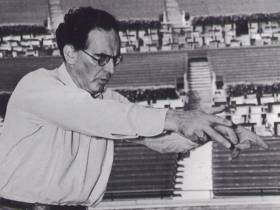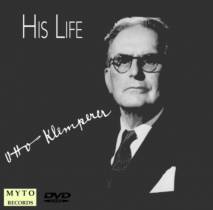
(Otto Klemperer in Hollywood Bowl, 1937) Otto Klemperer
(Breslau, 14 May 1885; Zurich, 6 July 1973) German conductor and composer of Jewish birth. After studying with Ivan Knorr at the conservatory in Frankfurt am Main, Klemperer followed Kwast to the Klindworth Scharwenka Conservatory in Berlin, where he also studied composition and conducting with Pfitzner.* In 1906 he replaced Oskar Fried at the last moment to conduct Max Reinhardt's production of Offenbach's Orphée aux enfers at the Neues Theater in Berlin. The previous year, on the occasion of a performance of Mahler's Symphony no.2, in which he directed the off-stage orchestra, he had first encountered the composer who was to exercise a decisive influence on his career.* It was on Mahler's recommendation that Klemperer was appointed chorus master and subsequently conductor at the Deutsches Landestheater in Prague in 1907 (making his debut in Der Freischütz), and then at Hamburg from 1910 to 1912. Further appointments followed at Barmen (1913-14), Strasbourg (1914-1917), where he was Pfitzner's deputy, and as musical director at Cologne (1917-24) and Wiesbaden (1924-7). After 1918 Klemperer rapidly emerged as one of the leading German conductors of his generation (in 1923 he declined an appointment as musical director of the Berlin Staatsoper, where he felt he would have had insufficient artistic independence). His sympathy for and authoritative performances of an unusually wide range of contemporary music, as well as a less overtly emotional interpretation of the classics than had been common among older conductors, made him appear an expression of the 'new age'. He was therefore a natural choice as director when, in 1927, the Prussian Ministry of Culture set up a branch of the Berlin Staatsoper, whose special task was to perform new and recent works and repertory works in a non-traditional manner. This, the Staatsoper am Platz der Republik, played in the Kroll Theatre, from which it drew the name by which it is usually known. Klemperer's period there was of crucial significance in his career and the development of opera in the first half of the 20th century. Oedipus rex and Mavra (both produced by Klemperer), Schoenberg's Erwartung and Die glückliche Hand, Hindemith's Cardillac and Neues vom Tage, Janácek's The House of the Dead and Weill's Der Jasager, as well as the impressive list of new and recent orchestral works given at the Kroll concerts, is evidence of both bold experiment and lasting musical values. Although the vocal standards of the Kroll Opera were inevitably more modest than those of its parent house on the Unter den Linden, the presence of conductors such as Klemperer (who also produced Fidelio and Don Giovanni), Alexander von Zemlinsky and Fritz Zweig ensured high musical standards; and designers such as Ewald Dülberg, Oskar Schlemmer and László Moholy-Nagy had a lasting influence on the development of operatic production after 1945. In particular, the Kroll Opera's drastically stylized production of Der fliegende Holländer (1929) was a decisive forerunner of Wieland Wagner's innovations at Bayreuth, after it reopened in 1951. After the closure of the Kroll Opera, Klemperer remained with the Staatsoper, where on 13 February 1933 he conducted Tannhäuser on the 50th anniversary of Wagner's death. In April 1933 he emigrated,* eventually going to the USA (where he had made his début in 1927). He became conductor of the Los Angeles PO (1933-9), conducted the New York PO and the Philadelphia Orchestra, and in 1937-8 played a part in the reorganization of the Pittsburgh Orchestra. In 1939 he underwent an operation for a brain tumour and his health and stability were so gravely undermined that he did little conducting for some years. His next regular engagement ws at the Budapest Opera (1947-50), where he conducted an extensive repertory before leaving there because of the Communist regime's restrictive musical policies. In the early 1950s Klemperer accepted guest engagements in spite of having suffered further accidents and illnesses. But his reputation in Europe had become largely a matter of hearsay. In 1954 a contract to conduct and make recordings with the Philharmonia Orchestra of London led to his appointment in 1955 as its principal conductor. At the age of 70 a new chapter in his life opened. By 1954 Furtwängler was dead and Toscanini retired, and Klemperer came to be generally accepted as the most authoritative interpreter of the Austro-German repertory from Haydn to Mahler, a reputation he retained until his retirement from public concert life in 1972.* In 1961 he made his Covent Garden début, conducting and producing Fidelio; Die Zauberflöte followed in 1962, and Lohengrin in 1963. On his death, Klemperer's collection of annotated scores, letters and documents was given to the RAM, London. In 1973 a documentary film Otto Klemperer's Journey through his Times, with a soundtrack composed largely of Klemperer reminiscing in German, was made by the Dutch director Philo Bregstein. Klemperer's performances were notable above all for their heroic dimensions and his architectural grasp. The detail revealed by his unfailingly lucid textures (predominent woodwind was a feature of his style) was always subject to his conception of a work as a whole. Yet this does justice only to the apollonian aspect of an unusually complex musical temperament. Until his later years, when his tempos became increasingly slow, his performances were also distinguished by a power and intensity that always remained subject to his grasp of structure. His interpretation of Mozart was controversial -- detractors found it too plain and lacking in nimbleness, admirers prasied its simplicity and directness. In Brahms he tended to emphasize what that composer owed to Beethoven rather than to Schumann, in Bruckner he realized the symphonies' monumental grandeur to a degree few conductors have equalled, and in Beethoven, a composer central to his vision, he achieved an uncontested authority. Even the characteristically unburnished Klemperer sound seemed essentially Beethovenian. But his outstanding achievement was to reveal the full extent of Mahler's genius, by rescuing his music from the rather sentimental style of interpretation that had been widely accepted. Klemperer studied composition with Schoenberg in the mid-1930s in Los Angeles and was a prolific if spasmodic composer. His output includes an opera, a considerable number of songs (some settings of his own texts) and nine string quartets, as well as six symphonies, in a post-Mahlerian style. Not all these works have been performed. Many were extensively revised and a number were destroyed. 
Запись из личной коллекции.
| 
